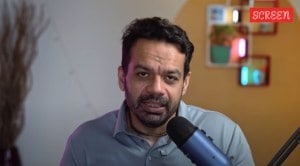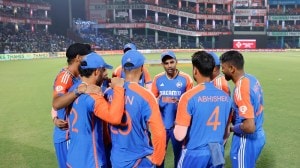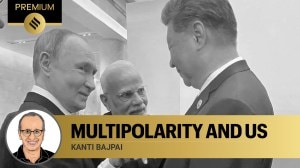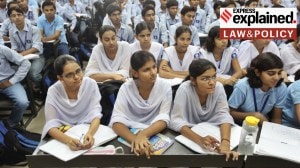Click here to follow Screen Digital on YouTube and stay updated with the latest from the world of cinema.
R Balki says his segment of Lust Stories 2 starring Neena Gupta is all about ‘common sense’: ‘It is a family lust story’
Filmmaker R Balki hopes that his segment in Netflix's Lust Stories 2 starring Neena Gupta, Mrunal Thakur and Angad Bedi, starts "commonsensical" conversation surrounding sex.
 R Balki has directed a segment in Netflix's anthology Lust Stories 2. (Photo: Express Archives)
R Balki has directed a segment in Netflix's anthology Lust Stories 2. (Photo: Express Archives) For the longest time, flowers played a leading role in portraying lust, love and romance on screen. Two flowers entangled with each other were used to show anything from a kiss to a sexual encounter. However, things gradually changed with time, with the advent of OTT allowing makers to present relationships and sex in a realistic and fluid manner. As Netflix’s Lust Stories 2 drops this Friday with four short films attached together, filmmaker R Balki, talks about why he thinks sexual portrayals in films are confusing, with makers shying away from showing them in the most “commonsensical” way.
In Gauri Shinde’s Dear Zindagi we saw Shah Rukh Khan’s Dr Jehangir giving valuable advice to Alia Bhatt’s Shaira. One of his most loved dialogues from the film is “Ek kursi choose karne se pehle agar hum itni saari kursiyan dekhte hain, toh ek life partner choose karne se pehle humein options nahi dekhne chahiye kya“. Now, in Balki’s segment in Lust Stories 2 — starring Neena Gupta — her character of “daadi maa” is heard telling Mrunal Thakur’s character “Ek choti si gaadi lene se pehle test drive karte ho na. Toh shaadi se pehle no test drive (You go for a test drive before buying a car, don’t you. Then why are you so shy of a test drive before marriage)?”
When asked where these rib-tickling ideas came from, Balki says in an interview with indianexpress.com, “It is simple… I don’t think much about it.”
View this post on Instagram
He elaborates, “It is the way you feel. It is such an obvious thing… it is about common sense. Neena Gupta plays a grandmother in the film and she looks like a very normal grandmother who does puja, she is conservative and traditional. Her thoughts are neither progressive nor conservative; what she is saying is just common sense. There are many reasons why people get married, but the human reason… what else can it be. Just check out before that you are good enough for each other. That question that most parents don’t ask, so it’s her. Who better than that person to ask these questions? She’s seen life.”
The synopsis of Lust Stories 2 emphasizes that the stories in this anthology are from the women’s point of view. So, as a male director, how does he get into a woman’s mind? Balki says he is telling his story from a “person’s point of view” and explains why he calls it “family lust stories”.
He adds, “I don’t differentiate between men and women, it is from a person’s point of view. It is not from a woman’s point of view or a man’s point of views, it is a point of view. Fundamentally it is just a conversation, it is what I call a ‘U’ rated lust story, it is just simple as that. You can watch it with the whole family, it is a family lust story. You always think of lust stories as raunchy stuff, of course all that is also beautiful, but we just chose to do this because we felt it was our fun thing to do, to have a talk about things in most families, which they never have. How can a father have a conversation with his daughter if she is sexually compatible with the guy she is seeing? Can any parent ever ask that question? I mean it’s the most important question, it is the basis of their lives.”
View this post on Instagram
When asked whether portrayal of sex has changed in films over the years, Balki says he’s not sure if there has been any change at all.
“I don’t know what has changed. The way we show love has diminished for sure. At least we had romance earlier and something to dream about even though it was not real. But now we are stuck in between, so we don’t know where to go… it’s confusing. (Back in the day) at least we had romance, we had a dreamscape to escape into,” he says.
When asked whether filmmakers and actors have become more daring when it comes to telling stories on screen which were once considered taboo, and the audience has become more sensitive? Balki says, “I don’t think it is the audience. Let’s not confuse those few guys who are managed trolls writing all sorts of negative things (online), they are not the audience. The audience is just saying ‘do I enjoy, do I like, does it move me?’ they are exactly the same. It is how we are interpreting, how we want to be known as the audience and we have given power to a lot of people who are negative.”


Photos



- 01
- 02
- 03
- 04
- 05




























